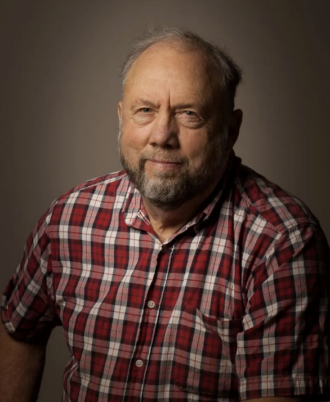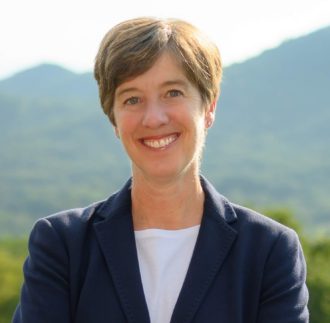Republican Warren Daniel of Morganton and Democrat Julie Mayfield of Asheville will defend their N.C. Senate seats in the Tuesday, Nov. 5 election. The candidates are representing districts that have changed since each was last elected in 2022, after Republican legislators redrew all the state’s legislative districts.
Daniel, a Morganton attorney, has represented District 46 since 2010. He will face Democrat John Ager, a retired Fairview farmer who previously served four terms in the N.C. House. The newly drawn district encompasses Burke and McDowell counties as well as the east, north and west portions of Buncombe County. It is considered Republican-leaning.
Mayfield, a senior policy adviser at MountainTrue and former Asheville City Council member, was first elected to District 49 seat in 2020. She is being challenged by Kristie Sluder, a family, crisis and recovery counselor based in Reems Creek.
District 49 now covers the central and southern parts of Buncombe County, including the City of Asheville. It leans Democratic.
Daniel and Sluder did not respond to multiple requests for participation in the Xpress Voter Guide.
Editor’s note: Xpress reached out to this year’s candidates prior to the devastation our community experienced from Tropical Storm Helene. Please keep this in mind as you review our 2024 Voter Guide.
District 46
 John Ager
John Ager
Website: ElectJohnAger.com
Occupation: Retired farmer and legislator and author
Previous candidacy or offices held: Four terms in the N.C. House of Representatives
Key endorsements: Not provided
Amount of money raised: Not provided
Top three donors: Not provided
What are the top state and local concerns for your constituents, and how do you plan to address them?
The N.C. General Assembly needs to quit meddling in education policy and adequately fund our public schools, community colleges and universities. It is time to quit rigging elections and end gerrymandering once and for all. The General Assembly needs to quit trying to micromanage women’s health care. I will make supporting our small farms and soil health a top priority. I will also make sure our people have clean water to drink and clean air to breathe. I also want to find ways to make family life more affordable, including child care, housing, health care and food costs. I enjoy helping people solve problems they have with our state government. I am a “fix the roads” and “pay the teachers” political leader. Government cannot solve everyone’s problems. We have to be pragmatic.
North Carolina ranks 49th in the country in the percentage of its gross domestic product spent on education, according to nonpartisan think tank Public School Forum. What will you do to improve state support of public education, including higher education?
Education is the primary responsibility of the N.C. General Assembly. For the past decade and a half, public school funding has been lagging in a state with a growing population and tax revenues. Our university system, once the envy of the country, has been riddled with partisan policies and attacks. We need to unburden our public schools so they have the same freedoms as charter schools and unburden the way schools receive funds from Raleigh.
North Carolina has a $1 billion surplus. Many in the state legislature have expressed using that to expand private school voucher programs. How would you spend the surplus?
Regarding private school vouchers, state tax dollars should only go to accredited private schools, not a few homeschooled kids in a church basement. Moreover, opportunity scholarships should only go to students who need the opportunity, not children from wealthy families. And finally, any school receiving state funds must show with comparable testing whether these students are achieving goals or not. I am fine with some surplus in our treasury to be used for emergencies, such as we have experienced with climate-related hurricanes. Raising pay across our traditional public schools would be a high priority for me, along with other pay raises for state employees like prison guards, DMV and Highway Patrol officers. We have too many vacancies in our state agencies. We are going to need general funds for our transportation needs, including passenger rail back to WNC. And finally, we need to fund a state museum of history and culture to showcase our rich heritage for students, residents and visitors.
What can the N.C. General Assembly do to improve health care and access to it in your district?
Clearly, the privatization of health care delivery has not gone well here in the mountains. HCA’s monopoly power has driven up costs while HCA has put their workers under enormous workloads. I support expanding the scope of practice for practitioners in various fields trained to provide a wide variety of care. I am very proud to have extended health care to half a million residents of North Carolona with Medicaid expansion and want to make sure that they can access the services they need.
Should the N.C. General Assembly allow the Buncombe County Tourism Development Authority to use more occupancy tax revenues to address affordable housing?
It is tempting to look for these dollars to solve a difficult and expensive problem in providing housing for those in the hospitality economy, but I think state guidelines for TDA money would not allow that approach. I think the hotel community, which has been thriving, should look at providing basic housing for hospitality workers in motels that are no longer competitive in our market.
Warren Daniel
Daniel did not respond to multiple requests for participation in the Xpress Voter Guide.
District 49
 Julie Mayfield
Julie Mayfield
Website: mayfieldforncsenate.com
Occupation: State senator, NC-49; Senior policy adviser, MountainTrue
Previous candidacy or offices held: District 49 senator since 2020; Asheville City Council member, 2015-20
Key endorsements: N.C. Association of Educators, Planned Parenthood Votes South Atlantic, Pro-Choice N.C., Lillian’s List, N.C. AFL-CIO, National Nurses United, Equality N.C., Sierra Club, Conservation PAC
Amount of money raised: $170,000
Top three donors: Mack Pearsall, Eastern Band of Cherokee Indians, Amy and Lynn Pletcher
What are the top state and local concerns for your constituents, and how do you plan to address them?
Top concerns are likely the economy, housing and mental health/homelessness. The economy is largely out of our control, but I will continue the effort to raise the minimum wage and to bring down the cost of living. Part of lowering the cost of living is increasing the supply of housing, generally, and affordable housing, specifically. I am leading a bipartisan, bicameral effort to enact state-level housing policy in 2025 that will advance both of those goals. In terms of mental health and homelessness, we need to invest more in mental health services and in building permanent supportive housing.
North Carolina ranks 49th in the country in the percentage of its gross domestic product spent on education, according to nonpartisan think tank Public School Forum. What will you do to improve state support of public education, including higher education?
I will continue to advocate raises for teachers and other school personnel, more per-pupil spending, and more counselors and social workers to provide our students with the constitutionally required sound, basic education. The Leandro plan does all of this, but the legislature refuses to fund it. I will also continue to advocate against private school vouchers for people who can afford to and already do send their children to private schools. As to higher education, we need to better fund community colleges and remove partisan politics from higher education boards, policies and programs.
North Carolina has a $1 billion surplus. Many in the state legislature have expressed using that to expand private school voucher programs. How would you spend the surplus?
Republican legislators just voted to put over $400 million more for vouchers for this year and for next. This takes money out of public schools directly through a reduction in the per-pupil allocation and indirectly in that those funds could be used to invest in public schools. I would invest that money in any combination of the following: state employee raises and staff expansion in key agencies, public schools, child care, mental health services, innovations waivers (for people with disabilities), affordable housing, election services or many other services.
What can the N.C. General Assembly do to improve health care and access to it in your district?
The primary health care issue here is the degradation of services and quality of care at Mission Health. Hundreds of doctors and nurses have left, and Mission Hospital was cited with “immediate jeopardy,” the severest penalty possible. This is all due to HCA, a publicly traded company that prioritizes profits over people. I will introduce several bills to address this. One would allow the N.C. attorney general to stop the sale/merger of a hospital if it would negatively impact the quality, cost, availability and accessibility of care. The second would strengthen the prohibition on the corporate practice of medicine.
Should the N.C. General Assembly allow the Buncombe County Tourism Development Authority to use more occupancy tax revenues to address affordable housing?
Yes. The state guidelines that govern occupancy taxes have not been revised in over two decades, but tourism and hospitality have changed significantly and now recognize that good places to visit should also be good places to live. Changing the guidelines to allow TDAs and local communities to decide together what the community needs are and how the tax revenue should be used to meet those needs is the logical step forward. Allowing some of the ever-increasing occupancy tax revenues to be used to expand housing that directly supports hospitality workers would be a welcome change.
Kristie Sluder
Sluder did not respond to multiple requests for participation in the Xpress Voter Guide.
Editor’s note: To look up which races you will vote for, visit avl.mx/6nq.



Before you comment
The comments section is here to provide a platform for civil dialogue on the issues we face together as a local community. Xpress is committed to offering this platform for all voices, but when the tone of the discussion gets nasty or strays off topic, we believe many people choose not to participate. Xpress editors are determined to moderate comments to ensure a constructive interchange is maintained. All comments judged not to be in keeping with the spirit of civil discourse will be removed and repeat violators will be banned. See here for our terms of service. Thank you for being part of this effort to promote respectful discussion.